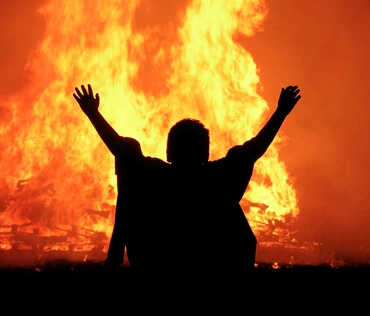1
Šeštaisiais metais, šešto mėnesio penktą dieną, kai aš sėdėjau savo namuose su Judo vyresniaisiais, Viešpaties ranka palietė mane.
2
Aš pamačiau prieš save lyg žmogaus pavidalą; nuo juosmens žemyn atrodė lyg liepsnojanti ugnis, o nuo juosmens aukštyntarsi žėrintis gintaras.
3
Jis ištiesė ranką ir nutvėrė mane už galvos plaukų. Dvasia pakėlė mane tarp dangaus ir žemės ir nunešė mane Dievo regėjime į Jeruzalę prie vidaus kiemo vartų šiaurės pusėje, kur stovėjo pavydo stabas, kuris kėlė pavydą.
4
Ir ten aš pamačiau Izraelio Dievo šlovę, kaip ją buvau matęs regėjime lygumoje.
5
Jis man sakė: “Žmogaus sūnau, pažvelk į šiaurės pusę”. Aš žiūrėjau, ir štai prie pat aukuro, prie vartų, stovėjo pavydo stabas.
6
Jis man kalbėjo toliau: “Žmogaus sūnau, ar matai, ką jie daro? Izraelio namai daro dideles bjaurystes, kad Aš pasitraukčiau iš savo šventyklos. Bet apsisuk, ir pamatysi dar didesnių bjaurysčių!”
7
Jis atvedė mane prie šventyklos vartų ir parodė man sienoje skylę.
8
Jis liepė man: “Žmogaus sūnau, kask po siena!” Prakasęs sieną, radau duris.
9
Jis liepė įeiti ir pažiūrėti, kas čia vyksta.
10
Įėjęs mačiau ant sienų roplių, nešvarių gyvūnų ir Izraelio stabų piešinius.
11
Prieš juos stovėjo septyniasdešimt Izraelio vyresniųjų su Jaazaniju, Šafano sūnumi. Kiekvienas laikė rankoje po smilkytuvą, iš kurių kilo aukštyn tirštas smilkalų debesis.
12
Jis klausė: “Žmogaus sūnau, ar matai, ką Izraelio vyresnieji tamsoje daro prie stabų piešinių? Jie sako: ‘Viešpats paliko kraštą, Jis nemato mūsų’ ”.
13
Jis vėl man tarė: “Apsisuk, ir pamatysi dar didesnių bjaurysčių”.
14
Jis įvedė mane į Viešpaties namus pro šiaurinius vartus. Čia sėdėjo moterys ir apraudojo Tamūzą.
15
Jis tarė man: “Žmogaus sūnau, ar matai, kas čia vyksta? Apsisuk ir pamatysi bjaurysčių, didesnių už šitas”.
16
Jis įvedė mane į Viešpaties namų kiemą. Tarp Viešpaties šventyklos durų ir aukuro stovėjo maždaug dvidešimt penki vyrai, nusigręžę nuo Viešpaties šventyklos į rytus, ir garbino saulę.
17
Jis tarė: “Žmogaus sūnau, ar matai, kas čia vyksta? Ar negana to, kas yra Jude! Šitie nusikaltimai bei smurtas vėl užtrauks mano bausmę.
18
Aš išliesiu ant jų savo įtūžį, nesigailėsiu jų ir nebūsiu jiems nuolaidus. Nors jie garsiai šauksis mano pagalbos, neišklausysiu jų”.







